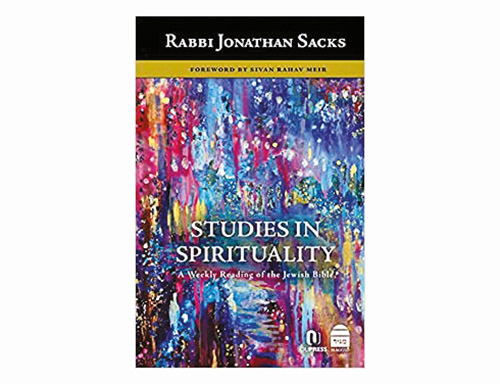
Reviewing: “Studies in Spirituality” by Rabbi Lord Jonathan Sacks. Koren Publishers Jerusalem. 2021. English. Hardcover. 318 pages. ISBN-13: 978-1592645763.
During the afternoon a few months ago, the power went out in the neighborhood on a hot and humid New Jersey summer day. The air conditioners stopped, the food in the refrigerator started to be of concern and panic started in the area. The power we expected that fueled us 24/7 was out. Neighborhood WhatsApp groups were busy about how to relocate food in freezers so they would not spoil. Fortunately, around 8:15 p.m., power was restored.
For the past few decades, the late Rabbi Jonathan Sacks was a source of immense and seemingly non-stop intellectual and spiritual power. With “Studies in Spirituality,” what was thought to be the eternal light of Rabbi Sacks is extinguished.
As Rabbi Sacks explains, spirituality is not the same as religion, even though the two are related. He writes that spirituality is, in essence, what happens when we open ourselves to something greater than ourselves. Some find it in the beauty of nature, art or music. Others find it in prayer, mitzvah performance or learning Torah. Moreover, others find it in doing acts of chesed, with friends, or those they love.
The brilliant essays in this final volume of Rabbi Sacks follow the weekly parsha. He took religion and spirituality quite seriously, and in each of these marvelous essays, he extracts profound spiritual messages.
As he explained in his book “Not in God’s Name,” the stories in the Chumash are far more subtle than we take them to be. They were divinely written to be understood at different levels at different stages in our moral growth. There is a surface narrative, as often taught to children, but there is also a much deeper story that we can only come to notice and understand when we reach a certain level of maturity. Rabbi Sacks calls this the concealed counter-narrative.
His brilliance is to reveal the concealment of that counter-narrative. For example, we just read that Avraham was chosen to be the father of the Jewish people. Who he was and why he was chosen are far from obvious. As to the story of the sacrifice of Yitzchok, which is one of the most challenging narratives to understand, he explains that the point of the story is not that Avraham loved God enough to sacrifice his son. Instead, God wanted to teach Avraham that we do not own our children, however much we love them.
While the subtitle of this book is “A Weekly Reading of the Jewish Bible,” it might be more accurate to call this an autobiography. The genius and uniqueness of Rabbi Sacks was that he was able to extract meaning from the Biblical narrative that speaks to the depth of a person. Never one to use his vast intellectual powers or sophisticated analysis to impress others, he mines the depths of the Chumash and extracts the deep meaning readers can apply to their lives. When he writes of the Biblical characters and their struggles, challenges and communion with God, he also seemingly is expressing his own experiences. And that is what makes this book so very real.
Rabbi Sacks wanted the very personal nature of the book to help readers find their own way to the Divine Presence, which is always there: the music beneath the noise, the call beneath the clamor, the voice of God within the human soul. And at that, he succeeds brilliantly.
By Ben Rothke













